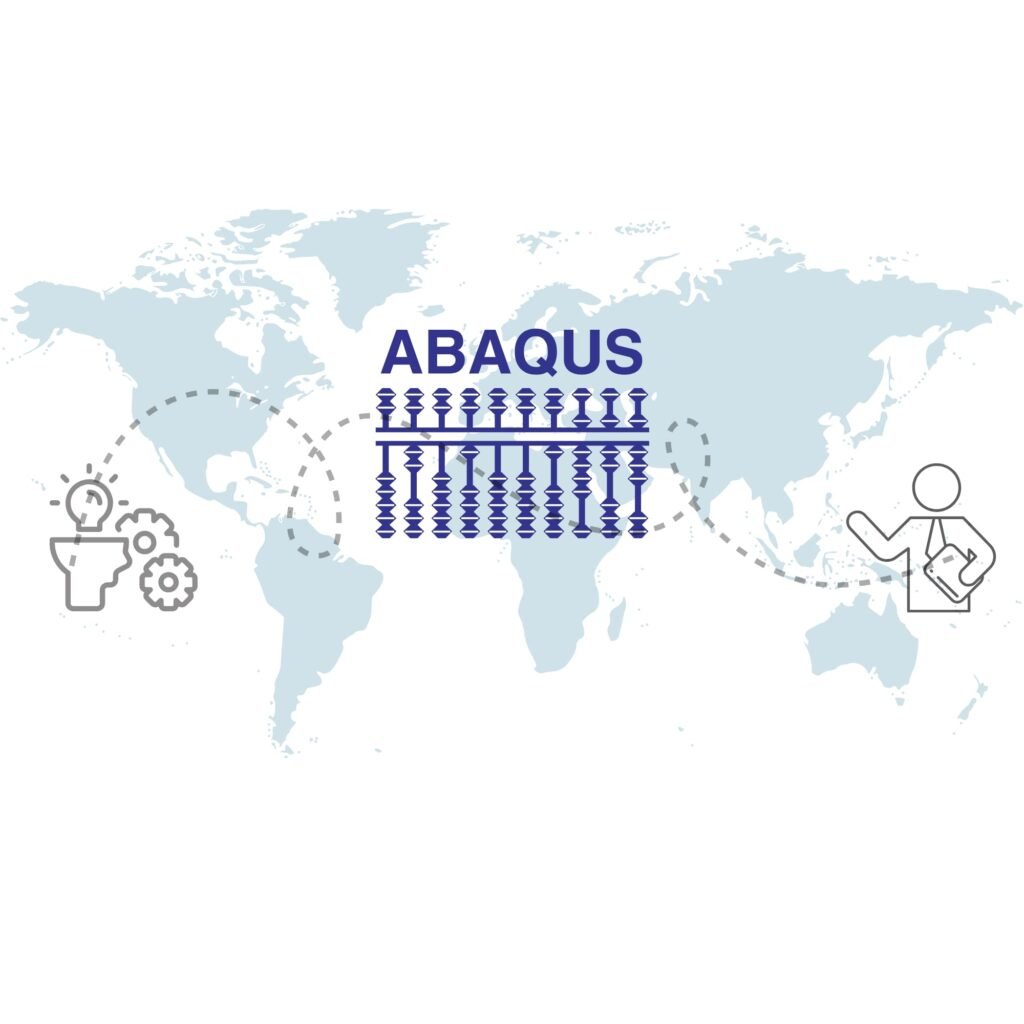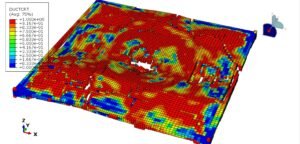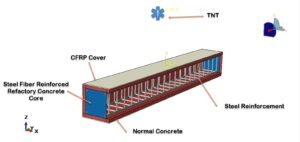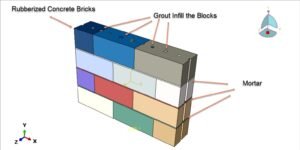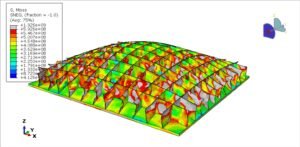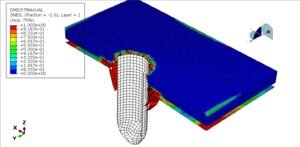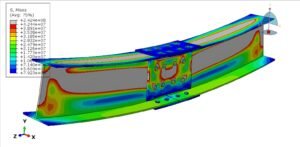Introduction
Picture a young engineer facing a complex Finite Element Analysis (FEA) problem in Abaqus – unsure how to proceed, deadlines looming. Now imagine that same engineer after expert training and mentoring: confidently simulating, interpreting results, and delivering innovations ahead of schedule. This transformation is the power of comprehensive Abaqus training and consultancy. Whether you’re an academic researcher or an industry professional, mastering Abaqus can elevate your projects to new heights. In this long-form guide, we’ll explore how our Abaqus courses, FEA training online, and consulting services empower engineers worldwide. We’ll also highlight success stories, cutting-edge topics like AI integration, and the keywords you’re likely searching for – from “Abaqus course” and “online Abaqus mentoring” to “FEA project support” and more. Get ready to discover a friendly, story-driven journey that showcases how expert Abaqus training and consultancy can make a real impact on your work.
Why Learn Abaqus? Bridging Academia and Industry Needs
Abaqus is not just any simulation tool – it’s a powerhouse used across industries and academia for realistic engineering analysis. From university labs to Fortune 500 companies, Abaqus has become a go-to software for tackling problems in aerospace, automotive, civil engineering, biomedical research, and more. Its versatility means you can analyze everything from simple linear static problems to complex non-linear, dynamic phenomena within one unified FEA environment. This broad capability is exactly why Abaqus training is essential for both students and seasoned engineers: it bridges the gap between theoretical knowledge and practical problem-solving. 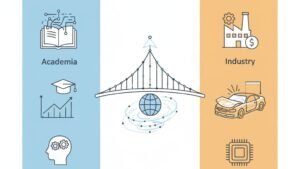
For academic users, proficiency in Abaqus opens doors to cutting-edge research opportunities. Imagine being able to simulate how a new composite material behaves under stress or predicting the biomechanical response of a medical implant – all before any physical prototype. With Abaqus skills, you can validate hypotheses and publish with confidence, knowing your simulations stand on the shoulders of an industry-validated tool.
For industry clients, the stakes are even higher. Products must be optimized for performance, safety, and cost-effectiveness, often under tight development schedules. Abaqus is renowned for handling the tough stuff – highly nonlinear behavior, complex contacts, transient dynamics – that many simpler tools struggle with. In fact, Abaqus helps engineers deal with everything from basic linear analysis to those “impossible” non-linear issues that arise in real-world designs. By investing in finite element analysis training for Abaqus, companies enable their teams to solve real-time engineering scenarios more effectively. The result? Shorter design cycles, fewer physical prototypes, and more innovation. It’s no wonder leading organizations around the world invest in expert Abaqus training for their staff– advanced simulation skills have become a strategic advantage.
Our Abaqus Training and Consulting Services at a Glance
To meet the diverse needs of engineers and researchers, we offer a 360° suite of Abaqus training, consulting, and mentoring services. These services are designed to be flexible and global – accessible whether you’re in North America, Europe, Asia or anywhere in between. Here’s a quick overview of what we provide:
- Live Online Abaqus Courses: Interactive training sessions conducted via Zoom/Google Meet, led by expert instructors. Get hands-on Abaqus experience in real time, ask questions, and learn by doing.
- Recorded On-Demand Courses: Learn at your own pace with our comprehensive library of recorded Abaqus tutorials and courses, from beginner fundamentals to advanced techniques.
- Project-Based Consulting & FEA Support: Got a critical simulation project or a tough FEA problem? Our Abaqus consultancy services pair you with seasoned consultants to tackle project-specific challenges and provide actionable solutions.
- One-on-One Mentoring & Team Training: Personalized online Abaqus mentoring for individuals, as well as tailored training programs for teams and companies. Whether you need a single session to troubleshoot an issue or a full team upskilling bootcamp, we’ve got you covered.
Each of these offerings emphasizes a human, supportive approach. We understand that learning advanced simulation can feel daunting, so we keep our style friendly and accessible. Think of us as partners in your learning journey – celebrating your “aha!” moments and guiding you through any hurdles.
Beginner to Advanced: Abaqus Courses for Every Level of Experience
One size does not fit all when it comes to learning Abaqus. That’s why our programs are carefully structured to serve everyone from absolute beginners to veteran analysts. If you’re just starting out, our introductory Abaqus courses teach you the core skills step-by-step: understanding the Abaqus CAE interface, building your first mesh, running a simple static stress analysis, and interpreting FEA results correctly. These fundamentals build a solid foundation for more complex simulations ahead.
For those with some experience, we offer intermediate courses that delve deeper. Maybe you’ve done basic linear analyses and now want to explore contact problems, material nonlinearity, or explicit dynamics – we’ve got modules for that. And if you’re an advanced user aiming to push Abaqus to its limits, we provide specialized training on topics like subroutine development (UMAT/VUMAT), fracture mechanics, and multi-physics coupling. In short, our training programs cover the full spectrum of Abaqus capabilities – from the simplest static analysis to the trickiest non-linear simulations.
Importantly, we tailor the depth and pace to your level. Our philosophy echoes what others in the industry have noted: effective Abaqus training should accommodate beginners and seasoned professionals alike. We often hear from students how relieving it is that they can ask “basic” questions without feeling judged, or from experts who appreciate that we skip straight to advanced material without wasting time. No matter where you fall on the experience scale, we have a program to suit your needs.
Our instructors are not just Abaqus users – they are FEA enthusiasts with years of academic and industrial experience. This means they bring real-world context to the virtual classroom. You’ll learn not only how to use Abaqus, but why certain approaches work better for certain problems, informed by experience. The goal is to shorten your learning curve and give you practical skills that you can immediately apply in your projects. As one training provider puts it, “Live one-to-one interaction with the instructor is assured” in small classes – we embrace that ethos fully. In our live sessions, you’re encouraged to engage, ask questions, even share your specific project challenges. Often, the discussion goes beyond slides and menus into brainstorming simulation strategies for a student’s particular case. This interactive, “learn by doing” approach helps the material stick, so you walk away truly empowered to use Abaqus on your own.
Topics Covered (From Basics to Advanced): To give you an idea of the breadth of our Abaqus course content, here are some key areas we cover:
- Fundamentals of FEA & Abaqus: Understanding the GUI, modeling workflow, meshing techniques, material properties, and simple static analysis.
- Intermediate Simulations: Contact modeling (surface interactions), dynamic analyses (implicit and explicit), thermal analyses, and solving convergence issues for non-linear problems.
- Advanced Topics: Nonlinear material models (plasticity, hyperelasticity, composites), failure and fracture (crack modeling, cohesive zones, XFEM), and multiphysics simulations (coupled thermal-structural, fluid-structure interaction basics).
- Customization & Automation: Using Abaqus Scripting Interface (Python) to automate tasks, writing user subroutines (UMAT/VUMAT) for custom material behavior, and integrating Abaqus with other tools or custom workflows.
- Results Interpretation & Validation: Post-processing techniques, interpreting stress/strain results, and correlating simulation with physical tests for validation.
By progressing through these topics, you’ll gain the confidence to tackle real engineering challenges – from validating that a bridge design can handle load variations, to optimizing a composite aircraft part for weight and strength, or debugging why a simulation isn’t converging. Our Abaqus course curriculum is regularly updated to include the latest features and best practices, ensuring you’re learning on the cutting edge. And because we serve both academia and industry, we balance theory with practice: you’ll get the academic rigor needed to understand why things work, paired with the practical tricks that come only from hands-on project experience.
Live Online Abaqus Courses and Mentoring (Flexible, Interactive Learning)
In today’s connected world, you shouldn’t have to travel or pause your work to get top-notch training. That’s why we emphasize FEA training online through live virtual classrooms. Using tools like Zoom or Google Meet, we recreate the experience of an interactive classroom right on your screen. You can join from anywhere – be it a home office, a university computer lab, or the shop floor during a lunch break. This flexibility is invaluable for busy professionals and students juggling tight schedules.
Our online Abaqus courses aren’t dry lectures or canned videos – they’re dynamic sessions where you actively engage. We share our screen to demonstrate Abaqus in action, then hand the reins to you with guided exercises. Stuck on something? Just speak up or drop a chat message, and the instructor will help in real time. In fact, we encourage questions and tangents. One huge benefit of our live training is that you can ask about your specific application or project and get immediate insight. As an example, one training service highlights that students are welcome to “ask questions about the material at hand as well as topics pertaining to their application of interest (i.e., pick our brains!)” during class. We wholeheartedly agree – those spontaneous Q&A moments often provide the most value. If you’re wondering how Abaqus might handle a weird material your company uses, or a tricky boundary condition in your research, just ask! Chances are others will benefit from the discussion too.
For those who prefer self-paced learning or want to supplement the live sessions, our recorded courses library is a goldmine. You’ll find high-quality video modules recorded from live trainings (minus any confidential Q&A), organized by topic. Perhaps you attended our Abaqus for Beginners live course and later need a refresher on meshing – simply find the corresponding video and re-watch that segment. Or if it’s 2 AM and you’re on a deadline, you can quickly search our tutorials for a solution to the error code you just encountered. Having both live interaction and on-demand resources gives you the best of both worlds.
Another advantage of online training is the global peer community it creates. In our live classes, you might be learning alongside a civil engineer from Dubai, a PhD student from London, and an automotive designer from Detroit. The diverse perspectives often spark interesting discussions – one person’s question can shed light on use-cases others hadn’t considered. This networking aspect can be inspiring and reassuring; you realize that whether you’re at a university or a company, many folks share similar FEA challenges. Over time, we’ve built a friendly community of Abaqus learners who often stay in touch via our forums or LinkedIn group to exchange tips and celebrate each other’s project successes.
One-on-One Online Abaqus Mentoring and Team Training
Sometimes, the fastest way to learn is with personal guidance. That’s where our mentoring and custom training options come in. Through one-on-one mentoring, you get a dedicated Abaqus expert focused solely on your learning goals. It’s like having a personal coach for FEA. In a mentoring session, you set the agenda: you can bring a list of questions, a troublesome model you need help with, or even ask for a condensed walk-through of a particular Abaqus module. The session can be as structured or as free-form as you want. We’ve done mentoring calls where we essentially pair-program a subroutine together, and others where we review an entire simulation workflow the client set up, suggesting improvements along the way. The point is, it’s your time – a safe space to dive deep into topics you find challenging or intriguing, at your own pace.
Our mentors have extensive consulting and teaching backgrounds, so they can adapt to different learning styles. Are you someone who learns by doing? They’ll guide you through building a model step by step. More of a theoretical learner? They’ll explain the principles behind simulation settings before applying them. We often hear how this personalized approach dramatically accelerates learning – an issue that might take days of frustration to figure out alone can be resolved in minutes with a mentor, all while you gain understanding to solve it yourself next time.
For organizations looking to upskill multiple team members at once, we offer custom team training programs. These can be conducted virtually (or on-site if preferred) for your engineering team, anywhere in the world. We’ll work with you to identify your team’s current skill level, the projects or analysis types most relevant to your business, and then craft a training curriculum just for you. For example, a manufacturing firm’s team might need an Abaqus course focusing on non-linear material modeling and fatigue analysis for product validation. Or a civil engineering group might want training on soil-structure interaction and seismic analysis using Abaqus. Our team training can combine lectures, hands-on workshops, and even live project consulting on one of your actual projects (a fantastic way to immediately apply skills to something that matters to your company). By the end of the program, your team will not only have new knowledge, but also a jump-start on real project work. Companies that have invested in such targeted training see clear benefits – enhanced skills and greater productivity among their engineers, leading to better designs and faster time-to-market.
One of the unique offerings we provide (for both individuals and teams) is a tutoring-consulting hybrid model. This means our consultant might help perform part of your project’s simulation and teach you how it’s done along the way. It’s an approach some clients love: you essentially get your urgent project completed with expert help, and simultaneously receive mentoring so you can repeat or modify the analysis later on your own. This blended service ensures you’re not left with a “black box” solution – you gain the know-how behind it. As CAE industry experts note, many clients appreciate this kind of engagement where the consultants perform the analysis and teach your engineers the workflow during the engagement. It’s truly a two-for-one benefit.
To summarize, whether you prefer one-on-one tutoring or want to train an entire team, we adapt to your needs. Our online Abaqus mentoring and custom training are about as close as it gets to having an in-house Abaqus guru by your side – guiding you, answering questions, and making sure you succeed.
Abaqus Consultancy & FEA Project Support – Solving Your Toughest Challenges
While training and courses are great for skill-building, sometimes you encounter an FEA challenge that requires immediate expert intervention. Maybe it’s a high-stakes project with a daunting simulation task, or you’re under-resourced and need an experienced Abaqus user to step in and help. This is where our Abaqus consultancy and project support services come into play. Think of it as having a seasoned Abaqus expert on call.
What does Abaqus consulting involve? In simple terms, we provide the expertise to get your simulation job done right – working as an extension of your team. This can range from short consulting sessions (perhaps you need advice on modeling approach or troubleshooting an error) to full project collaborations (where we help set up, run, and interpret simulations for a project). We pride ourselves on being flexible: whether you need a few hours of guidance or a few months of project-based support, we can scale our involvement to match. Clients often reach out for things like: optimizing a complex model to run faster, developing a custom material model via a UMAT subroutine, or performing advanced analyses (for example, a nonlinear crash simulation or a coupled thermal-structural analysis) that their in-house team isn’t comfortable with yet.
One key aspect of our FEA project support is the knowledge transfer that happens along the way. We don’t just deliver results and vanish; we explain what we did, provide clear reports, and can even record walkthroughs of the simulation setup. Our goal is to solve your immediate problem and leave you better equipped for future challenges. This reflects a broader trend in engineering consulting: companies increasingly prefer consultants who not only fix problems but also uplift the client’s own capabilities. In fact, our approach aligns with what CAE Assistant (an industry peer) describes: “Whether you need project-based consulting, one-on-one tutoring-consulting sessions, or long-term support, we tailor our Abaqus services to your goals”. By combining technical expertise with mentoring, we ensure the solutions we provide are sustainable and understood by your team.
Some might wonder, why hire external Abaqus consultants instead of doing analyses in-house? There are many scenarios where external consulting makes sense. If your team is swamped or unfamiliar with a particular simulation type, bringing in an expert saves time and avoids costly mistakes. Also, consultants often have cross-industry experience – we might apply a proven technique from the aerospace sector to solve a problem in civil engineering, for example. There’s also the matter of software access and licenses; not every company has all the add-ons or the latest version of Abaqus. By working with us, you indirectly get access to the wider simulation ecosystem we possess. And of course, it’s cost-effective: you pay for just the help you need, without long-term overhead. As noted in a comparison of consulting vs in-house analysis, you essentially gain “access to experienced FEA consultants with cross-industry experience” and avoid high overhead from software and training costs.
Our Abaqus online consultancy is truly global. We’ve assisted clients remotely in every corner of the globe via screen-sharing and cloud computing. Security and confidentiality are taken very seriously – we’re happy to sign NDAs and can use secure file transfer methods for any models or data you share. Over the years, we’ve tackled projects in automotive crash safety, oil and gas pipeline failure analysis, consumer product drop tests, biomedical device simulations, architectural engineering (think earthquake simulation of buildings), and more. Each project is a partnership: your domain knowledge plus our simulation expertise equals a reliable solution.
In summary, when you face a simulation roadblock or need to accelerate an FEA project, our consulting service is your lifeline. We’ll roll up our sleeves, apply our Abaqus expertise to support your project, and get you to the finish line with confidence. And by the end of it, you’ll have learned a thing or two as well – that’s our consulting promise.
Pushing the Envelope: Advanced Abaqus Topics and AI/ML Integration
Engineering simulation is a fast-evolving field. Beyond the “classic” applications of Abaqus (like static stress or crash analysis), new frontiers are emerging – and we make it a point to incorporate these cutting-edge topics into our training and services. Two areas worth highlighting are nonlinear advanced simulations and the exciting intersection of FEA with Artificial Intelligence (AI) and Machine Learning (ML).
Nonlinear, Multiphysics, and Beyond: Abaqus truly shines when it comes to nonlinear simulations – both material nonlinearity (plastic deformation, hyperelastic materials like rubber, damage and failure of composites) and geometric nonlinearity (large deformations, stability and buckling problems). Our advanced courses dive into these complexities. For instance, you can learn how to simulate metal forming processes with Abaqus Explicit, or predict crack growth using Abaqus’ extended finite element method (XFEM). We also explore Multiphysics capabilities – coupling thermal and structural analysis to model, say, welding processes or battery thermal runaway, and even fluid-structure interactions in a basic sense. By mastering these advanced topics, you’ll be prepared to tackle the most challenging scenarios in engineering. We blend theory with practical guidelines (material model selection, meshing strategies for convergence, etc.) so you can set up complex analyses with confidence.
Abaqus + AI/ML = The Future of Simulation: One of the most exciting trends is leveraging AI and machine learning to enhance FEA workflows. This isn’t science fiction – it’s already happening in leading engineering firms and research labs. Imagine training a machine learning model to act as a fast surrogate for a very expensive simulation, or to help optimize designs by learning from many Abaqus runs. In our training, we introduce these concepts to forward-thinking engineers. For example, we might demonstrate how you can use Python scripting to integrate Abaqus with an external optimization library or an AI toolkit. We’ll discuss real case studies, such as using a neural network to predict material behavior within an Abaqus model. In fact, recent developments showed that by integrating ML-trained metamodels into the Abaqus solver, it’s possible to speed up complex simulations. One study replaced a computationally expensive contact simulation with a fast-running ML surrogate model inside Abaqus, drastically reducing run-time while maintaining accuracy. This approach can be applied to any repetitive FEA task where an AI model can learn the input-output relationship and provide quick predictions. We share such examples to inspire you – so you know what’s on the horizon and can be ready to adopt it.
It’s not just about speed; AI can also help with smarter designs. By coupling Abaqus with machine learning, engineers are finding patterns in simulation data that lead to better design decisions (like identifying which geometrical features most influence stress hot-spots). Our blog often covers these emerging techniques, and our advanced workshops occasionally feature guest experts from the AI-in-engineering arena.
By staying up-to-date with these innovations, we ensure that our training clients are future-proof. When you engage with us, you’re not only learning the Abaqus of today, but also getting insights into the simulation trends of tomorrow. This is particularly compelling for academic users who might want to incorporate AI/ML in their thesis, or for companies aiming to stay ahead of the competition with the latest tech. Rest assured, as the technology evolves, we evolve our content – keeping an eye on Dassault Systèmes’ updates to Abaqus, as well as broader industry shifts toward things like cloud computing and data-driven modeling in FEA.
Success Stories: How Expert Abaqus Training Has Made a Difference
Nothing builds trust like real-world success stories. Over the years, we’ve been privileged to work with a wide range of clients – and seeing their growth has been the most rewarding part of our job. Here are a few anonymized stories and outcomes that showcase the impact of our Abaqus training and consulting (and how it might translate to your context):
- From Prototype Overruns to Simulation-Driven Design: A mid-sized automotive supplier came to us with a costly problem – they were relying too heavily on physical prototypes for testing product durability, leading to long development cycles. We provided an intensive FEA training online for their engineering team, focused on Abaqus fatigue analysis and material calibration. Within months, they shifted to a simulation-driven design approach. One engineer reported, “After the Abaqus course, we reduced prototype iterations by at least 30%. Now we catch design issues in simulation early, which is saving us both time and money.” This company went on to train more staff with us and even engaged our consultants on a project to simulate a complex assembly under crash loads. The result? They confidently landed a contract with an OEM, citing their advanced simulation capability as a differentiator.
- Academic Research Breakthrough: A Ph.D. student in civil engineering was struggling with modeling a nonlinear soil-structure interaction for her dissertation. She had tried learning from manuals and forums, but the tricky contact and convergence issues were roadblocks. Through one-on-one online Abaqus mentoring, we helped her set up the model step by step, explaining the rationale for each simulation setting. We also guided her on validating the model against some experimental data. Not only did her analysis finally run successfully, but she also understood it deeply enough to write a strong thesis chapter about the modeling approach. She later published a journal paper, acknowledging the training as a key factor. It was a proud moment for us too – reinforcing why a bit of mentoring can ignite academic success.
- Upskilling a Global Team: A Fortune 500 consumer electronics company needed to standardize FEA skills across its design centers in the US, Europe, and Asia. They chose us to deliver a customized Abaqus training program worldwide. We held live virtual classes across time zones (with recordings available for those who couldn’t attend live). The curriculum was tailored to their products – think drop test simulations for devices, thermal analyses for electronics cooling, etc. Over 50 engineers went through the program. Post-training surveys showed a significant boost in confidence: participants particularly valued the hands-on workshops and the fact that the instructors addressed their actual simulation questions during Q&A. Management noted improved collaboration between teams – since everyone now spoke the same “FEA language,” an engineer in India could share an Abaqus model with a colleague in Germany and they could iterate on it seamlessly. This success story underlines how training employees through a provider can pay off in organizational efficiency and innovation capacity.
- Consulting Triumph under Pressure: A small engineering consultancy firm had taken on a project involving a highly non-linear simulation (large deformation of a rubber seal over time) that was beyond their in-house expertise. Our FEA project support service stepped in. We worked closely with their engineer, effectively as a team member, to develop the Abaqus model and run the simulations. We encountered a few twists – material model complexities, long run times – but together we navigated them, even leveraging some Python automation to speed up parametric studies. The end deliverable to their client was successful, and the consulting firm’s reputation remained stellar. Their engineer later told us, “I learned so much working with you. It was like a masterclass in advanced Abaqus. Now I feel equipped to handle similar projects on my own.” Stories like this are exactly why we love what we do.
These examples all share a common thread: empowerment. Through training, mentoring, and consulting, we aim to empower individuals and teams to overcome challenges that once seemed insurmountable. The feedback we get – improved efficiency, personal skill growth, successful project outcomes – fuels our passion to continue refining our services. We’re proud that our approach has earned the trust of engineers worldwide. As one major training provider advertised, instructors delivering top-tier Abaqus training to “some of the leading and largest organizations” demonstrates the level of quality expected in this domain. We strive to meet and exceed that expectation for every client, big or small.
Building trust is also about transparency and community. We maintain an active blog (like this one) and resource center where we share tips, how-tos, and even answer common Abaqus questions openly. Even if you’re not yet a client, you can benefit from the free knowledge we disseminate – it’s our way of giving back and building a relationship with the engineering community. Many people first discover us through an article that solved a problem for them; they implement the solution, succeed, and later return for more comprehensive training or support. We cherish that journey from reader to empowered user.
Conclusion: Your Journey to Abaqus Mastery Starts Here
As we conclude this extensive guide, imagine yourself a few months from now: confidently setting up simulations in Abaqus, whether it’s a basic stress test or a gnarly non-linear crash analysis. Picture having a supportive mentor to turn to when you have questions, and a toolbox of skills that impress your colleagues (and maybe even your boss or professor!). This isn’t a fantasy – it’s the very real outcome that our Abaqus training, consultancy, and mentoring services strive to deliver for every learner and client.
We’ve designed our offerings to be human-centered and impact-driven. It’s not about churning through a software menu – it’s about solving real problems and telling success stories. From live online courses that bring global peers together, to personal mentoring sessions that target exactly what you need, to consulting that saves the day on critical projects, we cover all bases. And we do it with a friendly approach, seasoned with storytelling and real examples, because we know trust isn’t built on jargon – it’s built on understanding and rapport.
If you’ve been searching for terms like “Abaqus course online”, “FEA training online”, or “Abaqus consulting services”, we hope this article not only matched those keywords, but also answered the deeper questions behind them. Namely: How can I truly master Abaqus and apply FEA effectively in my work? The answer is by choosing the right learning partner. We’d be honored to be that partner for you.
Ready to take the next step? Whether you’re an academic eager to accelerate your research, or an industry team aiming to sharpen your competitive edge, let’s embark on this journey together. Explore our upcoming course schedules, reach out for a consulting inquiry, or even just send us a question that’s been bugging you – we’re here to help. With the right training and support, you’ll soon approach every simulation challenge with confidence. The world of advanced FEA and Abaqus expertise is at your fingertips – come join the ranks of engineers who have unlocked new possibilities through our program. Here’s to your future success in all your Abaqus endeavors!
Empower your engineering with Abaqus, we’ll guide you every step of the way. 🚀

